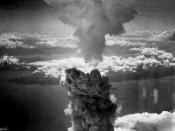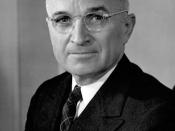Towards the end of summer, 1945, an atomic bomb was dropped on the Japanese cities of Hiroshima and Nagasaki. This event took place during the last few days of World War II following Japan's refusal to unconditionally surrender. The United States government and military leaders believed that eventually Japan would surrender, but nobody knew when that would happen and how many people would have to die in the meantime. In the summer of 1945 United States leaders debated the best way to end the war. The option of shocking Japan by using a new, highly effective technology, tested only once in New Mexico in June of 1945, seemed to be the most viable option. On August 6th 1945, a B-29 called Enola Gay was on its way to Japan carrying the bomb nick-named "Little Boy", a bomb that not only wounded Japan but changed America's relationship with its military allies, especially Russia (Alperovitz).
Since 1945 many historians have debated the reasons why the bomb was dropped. Victoria Sherrow and Robert Ferrell enunciated a commonly held belief; that the bomb was dropped to end the war quickly and save American lives. Some historians, including Gar Alperovitz and Herbert Feis, came to a different conclusion. Alperovitz argues that the decision to use the atomic bomb was exclusively political; the United States used this weapon to make an impression on Stalin aiming to prevent the spread of communism. That the bomb was dropped to save American lives was a legend made up by President Truman and the United States government to exonerate their actions before the people and the world.
Harry S. Truman replaced Franklin Roosevelt as president of the United States of America when Roosevelt died unexpectedly in April, 1945. By the time Truman took office, the situation in the Pacific was...


